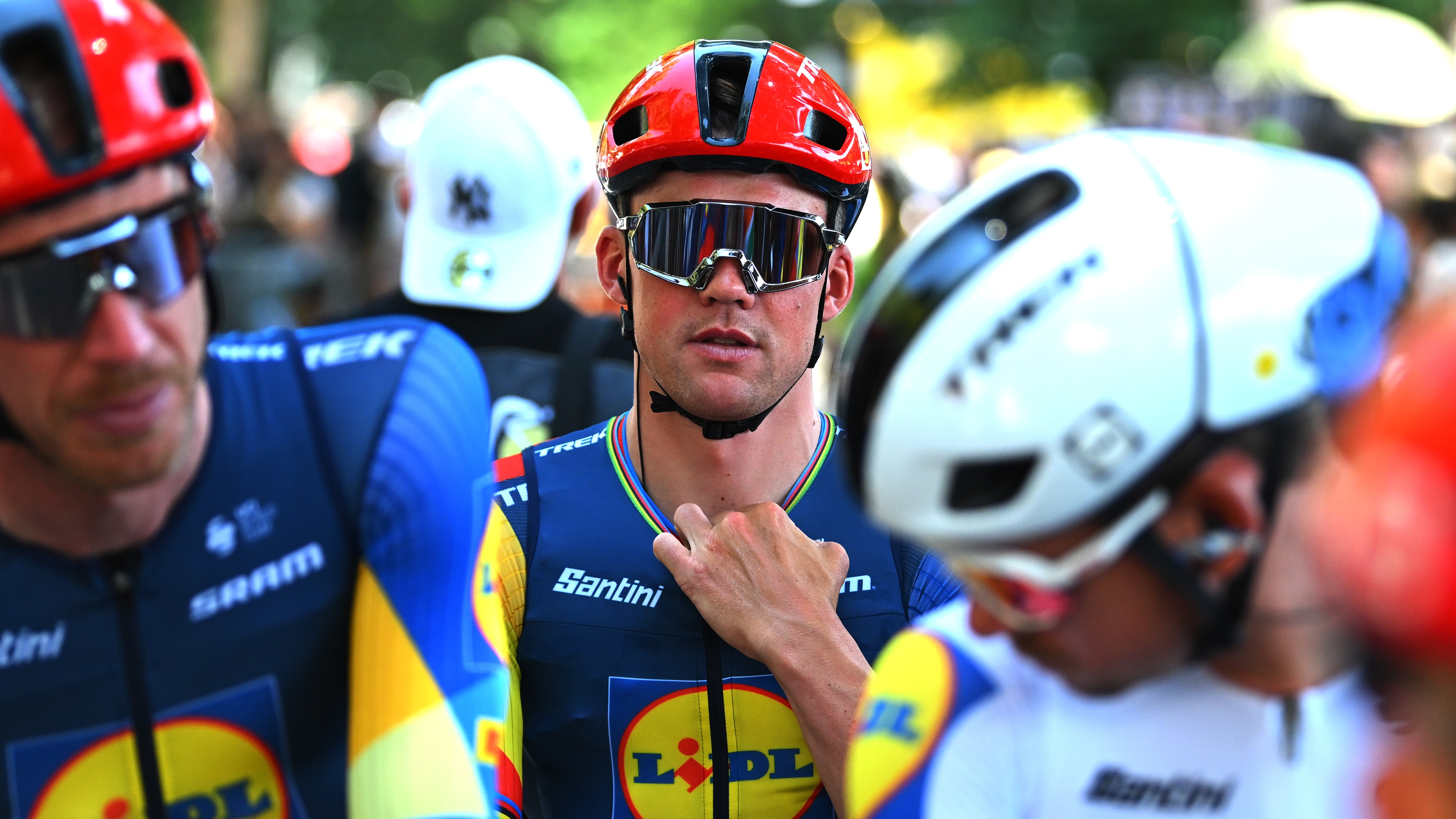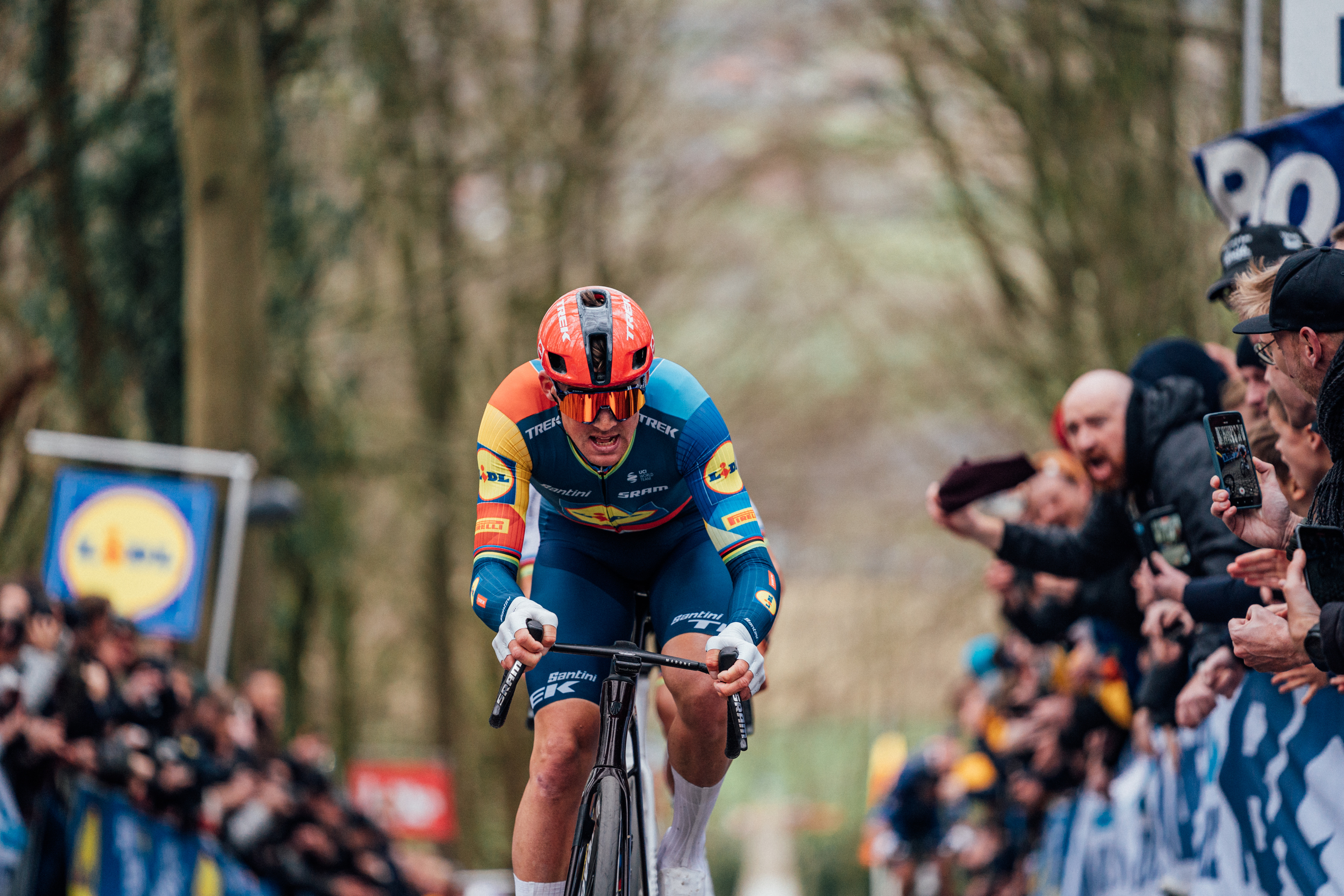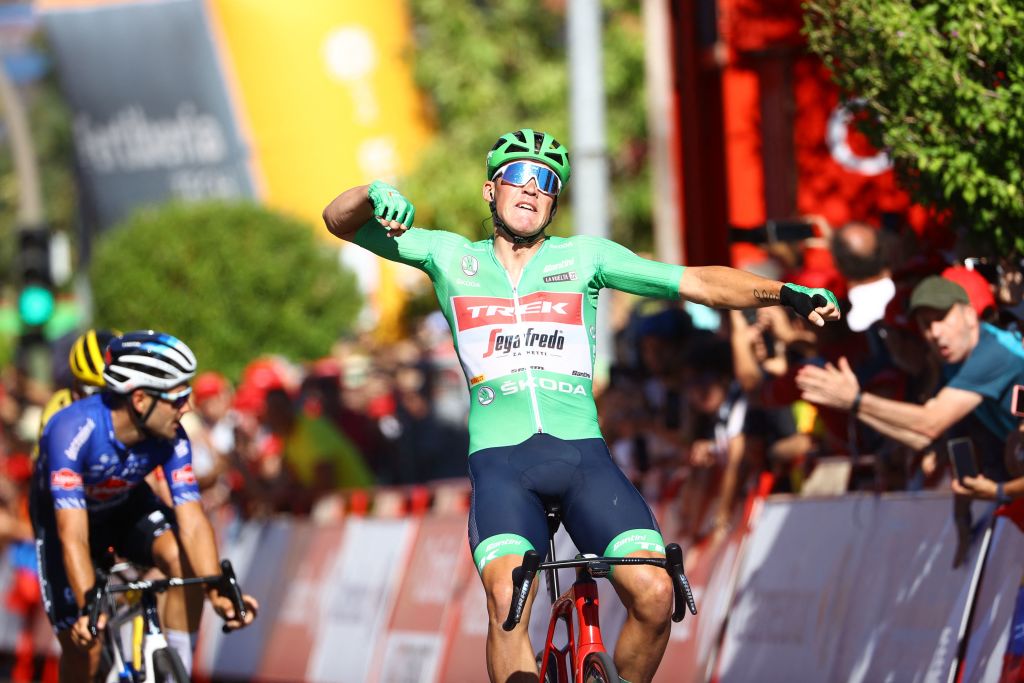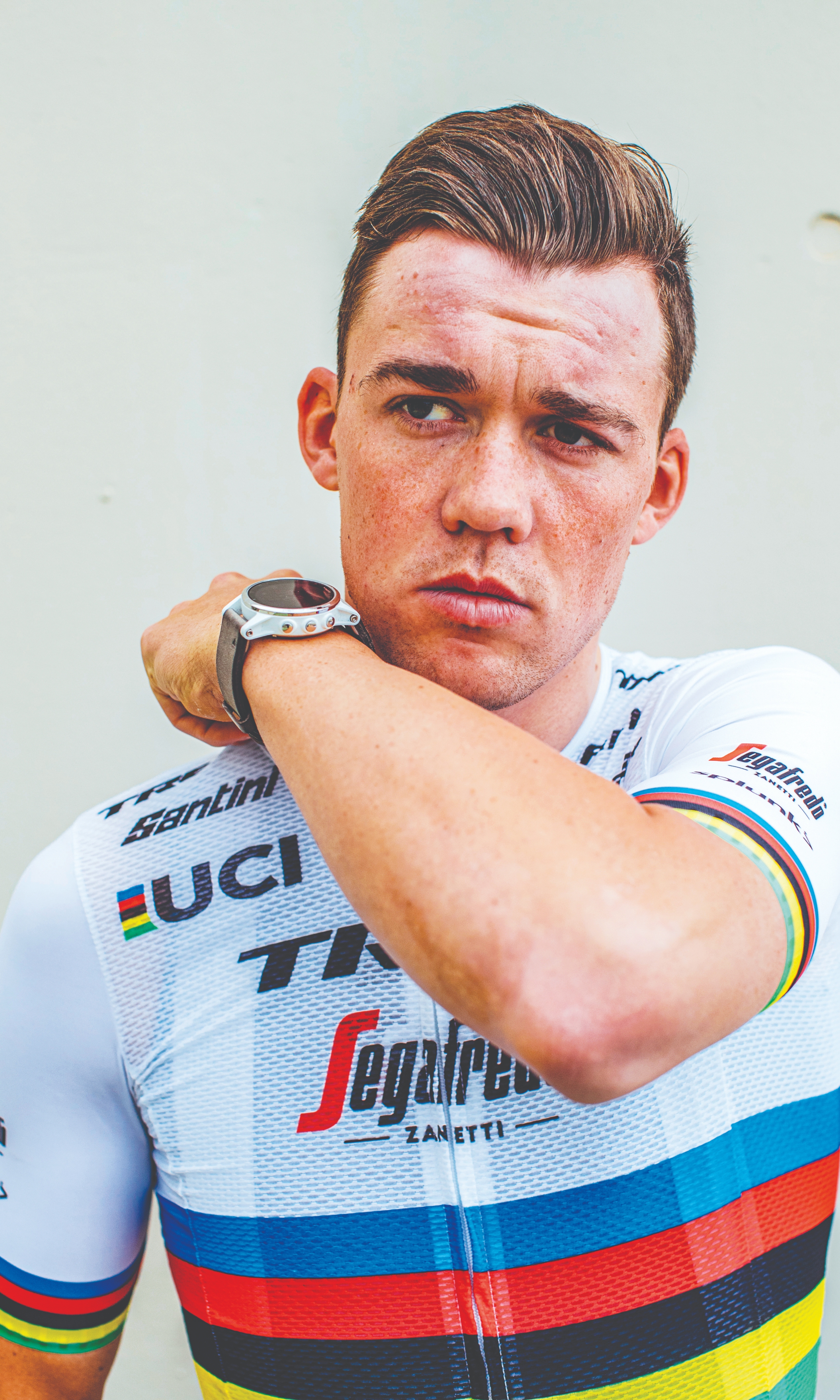
How do you kick off an interview with a rider who admits he has a “super high” ego? You paint a picture of him winning literally everything, absenting his main rivals – Mathieu van der Poel, Wout van Aert and Tadej Pogačar – from the scene. With those generational talents out of the way, then surely he, Mads Pedersen, would take a clean sweep? “I can’t answer that,” he cuts in, gruffly, “because they are here, and I can’t change that fact.” Flattery has got me nowhere. “Look, they are here, so it’s just a factor we have to deal with when we’re racing,” he continues. “They are also super good for the sport – cycling is better with them, even if sometimes it would be OK for me if they weren’t there. Anyway, even if they weren’t around, there’d be someone else who’d show up.”
If there is one thing that doesn’t interest the Dane, it’s winning the easy way – even hypothetically. Throughout his career as a WorldTour pro from 2017, Pedersen has had to fight for his status as one of the world’s best riders. After winning the World Championships in Yorkshire in 2019, aged 22, his first notable result, he had to prove his rainbow stripes were merited. It took time, but over the next six years he cemented his reputation, winning six Grand Tour stages – three at the Vuelta a España, two at the Tour de France and one at the Giro d'Italia – twice triumphing at Ghent-Wevelgem, and podiuming at both the Tour of Flanders and Paris-Roubaix. Now 28 and still on the same team (now called Lidl-Trek), Pedersen is established as one of the sport’s best one-day figures, a rider who can win sprints, get over hills and go long, but often persistently standing in his way of his success are the aforementioned trio. Is he now, riding his fifth Tour de France, cycling’s most under-appreciated superstar?
This summer could be career-defining for Pedersen, an opportunity for him to draw his reputation into alignment with his talent. A handful of Tour de France stages have been earmarked as being to his liking, and then follows the chance to add Olympic glory to his palmarès. Such is his self-belief that the Dane regards no race as unwinnable. “I’ve said many times: I don’t have the same talent as those guys but I have also shown that they are beatable,” he says, “and with that knowledge, I believe I can beat them in the big ones: Monuments, Olympics, Tour.”

No compromise
Over the past few years, I’ve interviewed Pedersen many times. He’s an engaging individual, highly energised, if spiky at times, and he always makes liberal use of the F-word. He’s also thoughtful, congenial and incredibly confident in his ability. On topics as diverse as social media, rider transfers, sporting politics, altitude camps, and relocating to tax havens (he moved to Switzerland in 2022), he typically begins with: “I don’t give a f**k.” It’s not so much arrogance as an extreme unwillingness to be distracted or derailed. “It might sound rough, but it’s my way or no way,” he says. “I am pretty fixed on my goal.”
Mads Pedersen, 28
Lidl-Trek
Palmarès
1 World Champs road race
3 Vuelta a España stages
2 Ghent-Wevelgem
2 Tour de France stages
2 Tour of Denmark GC
2 Paris-Nice stages
1 Vuelta a España points classification
1 Giro d’Italia stage
1 Kuurne-Brussels-Kuurne
Does he consciously avoid becoming consumed and defined by the sport? “Yes, although I really enjoy the process of getting in top shape,” he says, speaking to me by phone in late-May. “I also enjoy it when the goals and races are finished and it’s time to get back to my family and wife. I enjoy not being serious, not thinking about racing, and being able to do something different.”
His family has been a constant feature in all our conversations. In 2018, Pedersen noticed that his father Claus was getting burnt out after 35 years as a lorry driver, so he bought him a bike shop. “He’s happier. I see a different dad,” he told me. Last summer, he convinced Lidl-Trek to sign his brother Martin as a stagiaire so that “we could ride the Tour of Denmark together – this was a big dream for me.” Shortly after, Martin was recruited to the newly formed Lidl-Trek Future Racing development team at the age of 25.
Pedersen may have a large enough salary to look after his loved ones materially, but being a professional athlete has its drawbacks too. “Last year I slept in the same room as [team- mate Alex] Kirsch on more nights than I did with my own wife,” he points out. So when he’s home, he prioritises and cherishes what condensed time he gets to spend with Lisette, whom he married in 2019. “She deserves to be treated like a queen,” he says. “You have to find that combination of trying to have a normal life and still being a professional bike rider.”

Work/life balance
To date, Pedersen’s managed that task expertly: “My private life is going really well,” he says, while his professional life speaks for itself: palmàres comprising 42 professional victories as well as the green jersey from the 2022 Vuelta a España – and he’s aiming for the equivalent in the Tour and the Giro d’Italia. But a Monument victory still eludes him.
“It’s not a secret, I want to win one, it’s my biggest dream,” he says. “I still believe I can do it before my career is over – the fire is still there, it’s not shut off, and I will keep working really hard to beat him.”

If you haven’t guessed, the “him” is Van der Poel. “He was taking a piss on us at Roubaix,” Pedersen laughs, referring to his Dutch rival soloing to a three-minute winning margin. “I can’t be pissed because it was not even close,” he adds, reflecting on his third place. Is there anything he could do better to improve his chances? “I have to realise that I don’t have to be ahead all of the time,” he says, a reference to his decision to attack early at March’s Tour of Flanders. “I’m good enough now that I’m able to wait and follow, and know that if others have to follow me, they’ll be on the limit doing so.”
He will have plenty of chances at the Tour to try out these reformed, less hasty tactics. “[Team DS] Steven De Jongh and my coach Mattias [Reck] believe there will be four or five stages for me, excluding the sprint stages that will be hard [to win] but I’ll also try in, so there’s a few more options.” Day nine’s stage around Troyes, which includes 32km of gravel sectors, stands out for obvious reasons. “I’m really looking forward to that one,” Pedersen smiles, recalling an enjoyable recon.
With the final week of the Tour so mountain-heavy, many of the bigger one-day specialists are expected to pack their bags early – but not Pedersen. His focus will promptly switch to the Olympic road race, just 13 days after stage 21 in Nice. “I’ll finish the Tour,” he confirms. “Last year we raced the Worlds two weeks after the Tour and it went quite well [he finished fourth], so we’ll do the same, follow that recipe, and hope it’s good enough. I know I won’t blow up in the Olympics.” Can he win gold in Paris? “It’s a nice course, almost like a crit, but with only 90 riders and 275km, we don’t know how the race will go. Maybe it’ll be a day where everyone is willing to open up early and we’ll race mano a mano early on. That would be good for me.”
If he can add to his Tour de France stage win tally – having won a stage in each of the last two editions – and claim Olympic gold, Pedersen will finally achieve a public status in proportion to his self-belief. How greatly does he care how he is perceived by fans and pundits? “I am racing my bike to make myself happy and to achieve what I am aiming for,” he says. “In the end, it’s only cycling. It’s a privilege to be this good, to be able to fight for these victories and top results, and sometimes I have to pinch myself and say, ‘OK, Mads, it’s third place, that’s pretty good.’”
Pretty good is an understatement, and by the end of this summer there may be no disputing it. “One day, and I really believe it,” he says, “I will be on the top, winning more big ones, including a Monument.”







